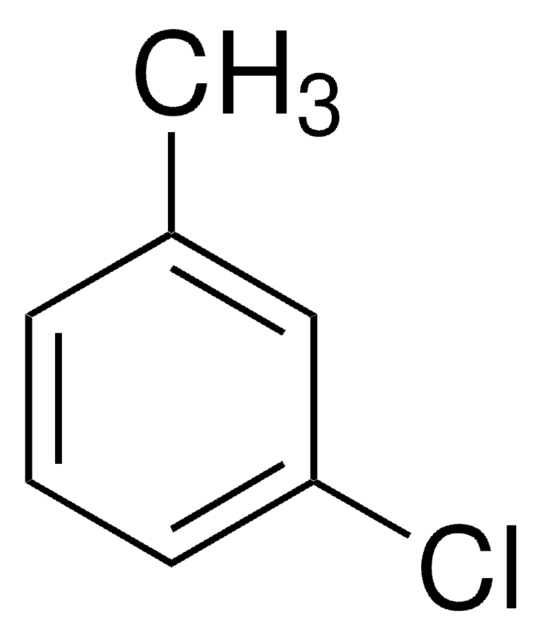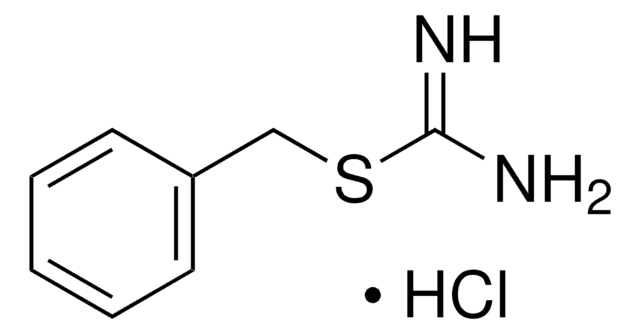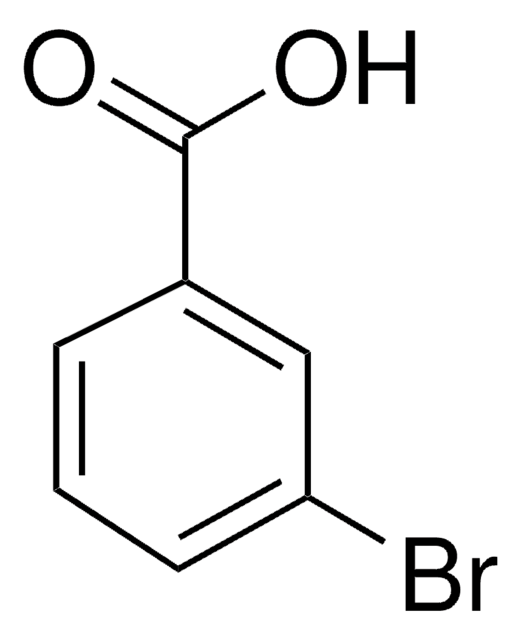C24604
3-Chlorobenzoic acid
ReagentPlus®, ≥99%
Synonym(s):
m-Chlorobenzoic acid
Sign Into View Organizational & Contract Pricing
All Photos(3)
About This Item
Linear Formula:
ClC6H4CO2H
CAS Number:
Molecular Weight:
156.57
Beilstein:
907218
EC Number:
MDL number:
UNSPSC Code:
12352100
PubChem Substance ID:
NACRES:
NA.22
Recommended Products
product line
ReagentPlus®
Assay
≥99%
form
powder
mp
153-157 °C (lit.)
SMILES string
OC(=O)c1cccc(Cl)c1
InChI
1S/C7H5ClO2/c8-6-3-1-2-5(4-6)7(9)10/h1-4H,(H,9,10)
InChI key
LULAYUGMBFYYEX-UHFFFAOYSA-N
Looking for similar products? Visit Product Comparison Guide
Related Categories
Legal Information
ReagentPlus is a registered trademark of Merck KGaA, Darmstadt, Germany
Signal Word
Warning
Hazard Statements
Precautionary Statements
Hazard Classifications
Eye Irrit. 2 - Skin Irrit. 2
Storage Class Code
11 - Combustible Solids
WGK
WGK 3
Personal Protective Equipment
dust mask type N95 (US), Eyeshields, Gloves
Certificates of Analysis (COA)
Search for Certificates of Analysis (COA) by entering the products Lot/Batch Number. Lot and Batch Numbers can be found on a product’s label following the words ‘Lot’ or ‘Batch’.
Already Own This Product?
Find documentation for the products that you have recently purchased in the Document Library.
Customers Also Viewed
V P Jayachandran et al.
Journal of industrial microbiology & biotechnology, 36(2), 219-227 (2008-10-23)
The compatibility and efficiency of two ortho-cleavage pathway-following pseudomonads viz. the 3-chlorobenzoate (3-CBA)-degrader, Pseudomonas aeruginosa 3mT (3mT) and the phenol-degrader, P. stutzeri SPC-2 (SPC-2) in a mixed culture for the degradation of these substrates singly and simultaneously in mixtures was
Alfredo Gallego et al.
World journal of microbiology & biotechnology, 28(3), 1245-1252 (2012-07-19)
An indigenous strain of Pseudomonas putida capable of degrading 3-chlorobenzoic acid as the sole carbon source was isolated from the Riachuelo, a polluted river in Buenos Aires. Aerobic biodegradation assays were performed using a 2-l microfermentor. Biodegradation was evaluated by
Sudip K Samanta et al.
Molecular microbiology, 55(4), 1151-1159 (2005-02-03)
Rhodopseudomonas palustris strain RCB100 degrades 3-chlorobenzoate (3-CBA) anaerobically. We purified from this strain a coenzyme A ligase that is active with 3-CBA and determined its N-terminal amino acid sequence to be identical to that of a cyclohexanecarboxylate-CoA ligase encoded by
Hee-Sung Bae et al.
Chemosphere, 55(1), 93-100 (2004-01-15)
An anaerobic continuous-flow fixed-bed column reactor capable of degrading 3-chlorobenzoate (3-CBA) under denitrifying conditions was established, and its rate reached 2.26 mM d(-1). The denitrifying population completely degraded 3-CBA when supplied at 0.1-0.54 mM, but its activity was partly suppressed
Caroline Laemmli et al.
Archives of microbiology, 181(2), 112-121 (2003-12-17)
Ralstonia eutropha JMP134 possesses two sets of similar genes for degradation of chloroaromatic compounds, tfdCDEFB (in short: tfdI cluster) and tfdDII CII EII FII BII (tfdII cluster). The significance of two sets of tfd genes for the organism has long
Our team of scientists has experience in all areas of research including Life Science, Material Science, Chemical Synthesis, Chromatography, Analytical and many others.
Contact Technical Service














